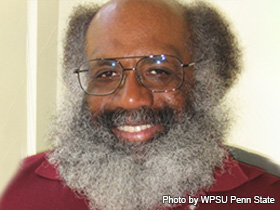You are here

Born: 9/7/1950
Bradley's 1981 book, The Chaneysville Incident, which tells of runaway slaves in Western Pennsylvania, won the PEN/Faulkner Award.
David Bradley was born and raised in Bedford, a small farming community near the border of Maryland. He studied creative writing and English in Philadelphia, where he drew the inspiration for his first novel from working-class people at a local bar which he frequented. His mother's research as a historian helped her to discover the legend of the 13 runaway slaves that became the title of his second novel. He is currently an associate professor of Fiction in the Creative Writing Program at the University of Oregon.
David Bradley, born in 1950, is the sole son of Harriet Bradley and Rev. D. H. Bradley, Sr. He attended local public schools in Bedford, and in June 1968, he graduated from Bedford Area High School. He attended the University of Pennsylvania and graduated summa cum laude in 1972. His majors were English and creative writing. Later, Bradley conducted graduate work at Kings College in London and graduated with an M.A. in United States Area Studies.
Upon his graduation, Bradley was named a National Achievement Scholar, Presidential Scholar, and a Benjamin Franklin scholar. He was also awarded a Thouron British-American Exchange Scholarship. After an interview with the New York Times Book Review, Bradley realized, having grown up in a rural white society during the 1960s and 1970s, that black people had no power. He felt more akin to many of the people who went to his neighborhood bar on South Street in Philadelphia. From talking to this group of working-class people, Bradley drew the inspiration for his first novel, South Street.
South Street was written while Bradley was still in college. It talks about a ghetto of Philadelphia and life as seen through its three centers for social and cultural interaction: Lightnin' Ed's Bar and Grill, the Elysium Hotel, and the Word of Life church. In this novel, Bradley examines the common binding ties that hold all of the people who frequent these establishments together. The novel focuses on life in the ghetto through five people's points of view. From his first work, readers glean a sense of Bradley's wit: broad, ironic, and unabashed. This has led him to be compared to the actor and comedian Richard Pryor. A few critics seemed to think that Bradley's inability to make it clear as to whether the several points of view in his story are to be parallel or individual is one of the shortcomings of his first work.
Bradley's next work, The Chaneysville Incident, won him the Pen/Faulkner prize in 1982. This was his most critically acclaimed work, and for Bradley was his most interesting, because it stemmed from an actual discovery near where he lived in Bedford. His mother was a historian and, during research she was conducting, found the unmarked graves of 13 slaves. There was even a local myth surrounding the graves that she managed to confirm. The slaves were trying to escape to freedom via the Underground Railroad and upon finding out that they were to be recaptured, asked to be killed instead. This discovery interested Bradley, and he wrote an unpublished collection of short stories about it.
Currently, Bradley is an Associate Professor of Fiction in the Creative Writing Program at the University of Oregon. Before that, he taught creative writing at Temple University in Philadelphia for 20 years. His current works include two nonfiction books, Orphan Pieces and The Bondage Hypothesis: Meditations on Race, History, and America. Also, he is working on a short collection of fiction entitled Raystown. In addition to his novels, Bradley has also made contributions in the form of articles to several magazines and periodicals, including the New York Times, Redbook, Los Angeles Times, and the New Yorker.
- South Street. New York: Grossman, 1975.
- The Chaneysville Incident. New York: Harper Perennial, 1981.
- "David Bradley." University of Oregon. 2005-2006. 30 Jan. 2006. <>http://darkwing.uoregon.edu/~crwrweb/faculty/davidbradley.htm>.
- "David Bradley." Answers Corporation. 1999-2005. 27 Jan. 2006. <>http://www.answers.com/topic/david-bradley-author>.
- "David Bradley — Fiction." Summer Writer's Conference of Pine Manor College. 2006. 26 Jan. 2006. <>http://www.pmc.edu/solstice/faculty_06.html>.
- "Fiction/Non-Fiction Panelist Biographies." Ohio Arts Council. 2006. 30 Jan. 2006. <http://www.oac.state.oh.us/grantsprogs/documents/ CopyofFictionNon-fictionbios.pdf>.
- Smith, Valerie. "David Bradley." Dictionary of Literary Biography. Gale Group. 1984. 25 Jan. 2006. <>http://galenet.galegroup.com/>.
- Watkins, Mel. "Thirteen Runaway Slaves and David Bradley." New York Times Book Review (19 Apr. 1981): 7, 20-21.
Photo Credit: Jonjalin. "David Bradley." 11-Oct-09. Photograph. Licensed under Public Domain. Cropped to 4x3, Filled background. Source: Wikimedia.
